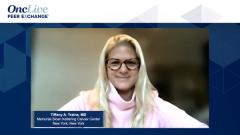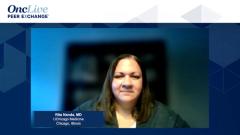
CIN: Adopting SIMBA Therapy Into Clinical Practice
A panel of oncologists react to their interest in using plinabulin as prophylaxis against chemotherapy-induced neutropenia in future clinical practice.
Episodes in this series

Hope S. Rugo, MD, FASCO: With plinabulin, we heard about some of the efficacy data that exist in the non–small cell lung cancer space. We also heard about the breast cancer data in terms of growth factor. If you had this, where would you use it and what would be the barrier to use?
William J. Gradishar, MD: The key thing is identifying the patients who are greatest at risk for profound neutropenia, which may be based on both patient characteristics and also depending on the regimen being used. In those situations empirically using a drug like this may diminish the frequency with which we observe severe neutropenia, and it will lead to better-tolerated regimens, fewer hospitalizations, and all the consequences of those hospitalizations.
Of course, the drug needs FDA approval, but assuming we were to get that, I think at least in the breast cancer world where we’re most inclined to use it is in the adjuvant setting, or the early stage more broadly, because we use so many of these therapies preoperatively now. If we can make treatments that we use with curative intent that much more tolerable, the overall quality of life of patients will improve.
Hope S. Rugo, MD, FASCO: That’s a really good point. Rita, what is your interest in using this? Would you use this across the board, more intensive chemotherapy? How is the efficacy data that might be obtained in the future going to influence your use?
Rita Nanda, MD: The data that we’ve reviewed are interesting. I think that above and beyond the neutropenia benefits, the anticancer properties are very exciting. I would imagine using it more broadly, absolutely in the early stage curative setting, but there are some regimens I use in the advanced-cancer setting, like sacituzumab, for example, where I oftentimes run into neutropenia and end up dose-reducing or incorporating growth factor. I think in this era of COVID-19, it is so challenging to get IV [intravenous] therapy time, to reschedule, and get approval for growth factor. I think there’s an opportunity to be able to keep patients on track, particularly for those who I know are going to struggle. I have patients who I know are going to have issues with sacituzumab, but I still start at the starting dose. I generally do not dose reduce unless there’s organ dysfunction or something like that and I’m using it in the previously unstudied type of patient population.
I think for patients who have really bulky disease in the advanced cancer setting, they’re really symptomatic, this is my shot to try to get their disease under control, or I’m going to lose that opportunity to continue them on therapy, and I want to keep them on track. I think there are certain situations there where I would consider using an agent, particularly for those patients who I know are going to struggle with cytopenias.
Hope S. Rugo, MD, FASCO:I think that’s a great point, they are all very good points, what we’re dealing with right now versus the past and our need to get approvals for drugs, and the cost of actually giving drugs at home where many of our patients have a significant share of cost. So this would avoid that as well, although you still need to get approval by insurance. Tiffany, what remaining questions do you have about plinabulin as a SIMBA [selective immunomodulating microtubule binding agent]?
Tiffany A. Traina, MD: Maybe I’m getting a little greedy, but as I think about the data that we saw from PROTECTIVE-2, my next question is, can we use this in some way for a weekly regimen that needs support, which would be so much easier for our patients? Or could we use it without pegfilgrastim, just as a single agent? I don’t think we have the studies yet obviously to answer those questions, but I would want to see, can we have both anticancer benefits plus neutropenia support and help our patients on those weekly regimens, and try to have it all?
Hope S. Rugo, MD, FASCO:That’s interesting. I would love to see the efficacy data somewhere and a little more information with a platinum agent about platelet preservation too. Those are some other areas that I think would be really interesting to learn more about in the future in planned studies.
Transcript edited for clarity.






































